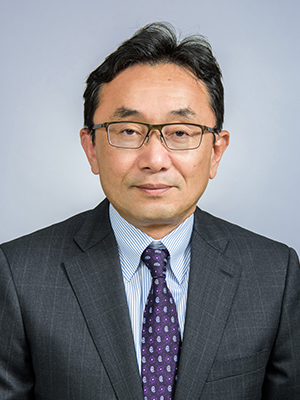Welcome Message
Greetings
Shoji Shimose, MD
President of the 54th Annual Musculoskeletal Tumor Meeting
of the Japanese Orthopaedic Association
National Hospital Organization
Kure Medical Center and Chugoku Cancer Center

It is my pleasure to invite you to the 54th Annual Musculoskeletal Tumor Meeting of the Japanese Orthopaedic Association, which will be held at the International Conference Center Hiroshima for two days on Thursday, July 15 and Friday, July 16, 2021. On behalf of the National Hospital Organization Kure Medical Center and Chugoku Cancer Center, I am honored to organize this long-established meeting in cooperation with the Department of Orthopaedic Surgery at Hiroshima University and the Alumni Association.
The main theme of the meeting is “Future Strategies for Tumors and Cancer-related Problems in Locomotive Organs.” Improving oncological prognosis while addressing locomotor disorders has been a challenge for bone and soft tissue tumors that arise in locomotive organs. In recent years, we have seen a dramatic improvement in diagnostic techniques, including advances in MRI and ultrasound imaging and the introduction of PET/CT. In addition, advances in tumor resection techniques, including intentional conservative surgery and reconstructive procedures, have raised expectations that more functional preservation of the affected extremities may be possible.
Although bone and soft tissue tumors represent one of the fields of locomotor disorders, orthopaedic surgeons who do not specialize in tumors may find themselves somewhat estranged from this particular field. In fact, there may even be a tendency to avoid involvement when it comes to cancer. One in two people in Japan alive today will experience cancer and undergo treatment at some point in their lives. With the introduction of new therapies, such as molecular targeted drugs and immune checkpoint inhibitors, the prognosis for cancer patients has improved significantly. Meanwhile, some cancer patients who suffer from pathologic fractures may miss out on the opportunity to receive chemotherapy due to deterioration in performance status (PS) as a result of impaired ambulatory gait function. There is a need for more orthopaedic surgeons engaging in locomotor problems associated with bone metastasis, so that cancer patients can receive optimal treatment.
In order to improve treatment for bone and soft tissue tumors, wide-ranging research and further progress and advancement will be necessary. Another important issue is the promotion of multidisciplinary treatment in cooperation with specialists in various fields—pathologists, radiologists, plastic surgeons, oncologists, etc. Examples of such treatment include heavy ion radiotherapy for unresectable tumors and novel drug therapy for malignant soft tissue tumors. In order for cancer patients to receive optimal treatment, as many orthopaedic surgeons as possible will have to be engaged in cancer-related locomotor issues. We are polishing our plans to make the meeting interesting to all, so that not only oncology experts but also many orthopaedic surgeons will be interested in participating in this year’s meeting.
The site of the meeting, the International Conference Center Hiroshima, is located within the Hiroshima Peace Memorial Park in the central area of Hiroshima City. If you go a little further, you will be able to discover such historic places as Itsukushima Shrine (Miyajima), a World Heritage Site. We look forward to seeing you all.

